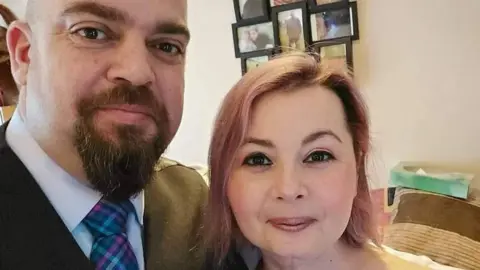Hit reporter
 Laura Marston
Laura MarstonA clinical study suggests that hundreds of thousands of people with advanced head and neck cancer can live longer without cancer due to an immunotherapeutic drug.
This is the first sign of a breakthrough for patients with this difficult to treat cancer for 20 years, scientists who are behind research say.
The 45 -year -old Laura Marston from Derbishir says that she is “amazed that it is still here” after she was given “terrible” chances of survival after the diagnosis of the common language of the tongue six years ago.
She received immunotherapy before and after the operation, which, according to researchers, helps the body learn to attack cancer if it returns.
Cancer in the head and neck, as you know, is difficult to treat, and there were few changes in how patients receive treatment for two decades.
More than half of them diagnosed the head and neck cancer, die for five years.
Laura Dali only 30% of the chance to survive for so long after her diagnosis in 2019 after her language had an ulcer, which will not disappear.
The next step was the main operation to remove the tongue, as well as the lymph nodes in her neck, and then she had to learn to speak and eat again.
“I was 39 years old, and I was devastated,” she said to BBC News.
As part of the international study of new methods of cancer treatment, with the participation of experts from the institution of cancer studies in London, Laura was one of more than 350 patients, given the immunotherapy drug Pembroralizumab before and after surgery in order to obtain body protection.
Professor Kevin Harrington, who led the testing in the UK, explains: “We give the immune system the opportunity to look at the tumor well to cause antitumor immunity, and then, after removing the tumor, we continue to strengthen this immune response, giving the drug constantly up to a year.”
A similar number of patients with a diagnosis of similar cancer received normal help. All of them had an improved cancer of the head and neck in one area, which did not spread to the rest of the body.
The new approach showed positive results. This doubled the duration of the time of patients who were free of cancer, on average, from 2.5 to five years.
Three years later, patients receiving pembrolizumab had 10% lower the risk of their cancer returning in other parts of the body.
‘Returned my life back to me’
Six years later, Laura has been working full -time and says that she “in a good place and does very well.”
“It was phenomenal for me, because I am here, capable of talking to you.
“I did not expect to take so far,” says Laura.
“My forecast was quite terrible.”
She had a muscle removed from her left hand and put in her mouth to fill the void left by her tongue. It was a difficult journey.
“Just having this amazing immunotherapy has returned my life to me again.”
Researchers say that the key to their results was to provide patients with the drug before surgery, which teaches the body to hunt and kill cancer if it returns when it returned.
Professor Harrington says that immunotherapy can change the world for these patients.
“This significantly reduces the likelihood of the spread of cancer around the body, after which it is incredibly difficult to treat,” he said.
About 12,800 new cases of head and neck cancer are diagnosed in the UK every year.
According to Professor Harrington, this approach worked “especially good” for some patients, but it was “very interesting” to see how treatment benefits all patients in the study. He added that now it should be available on NHS.
The results of the study are presented at the annual assembly of the American Clinical Oncology Society (ASCO).
The test, which, called Keynote, included 192 hospitals in 24 countries, led the medical school of the University of Washington in St. Louis and was funded by the pharmaceutical company MSD.
Source link
, , #immunotherapeutic #drug #doubles #survival #cancer #breakthrough #examination, #immunotherapeutic #drug #doubles #survival #cancer #breakthrough #examination, 1748723204, the-immunotherapeutic-drug-doubles-the-survival-of-cancer-in-a-breakthrough-examination

